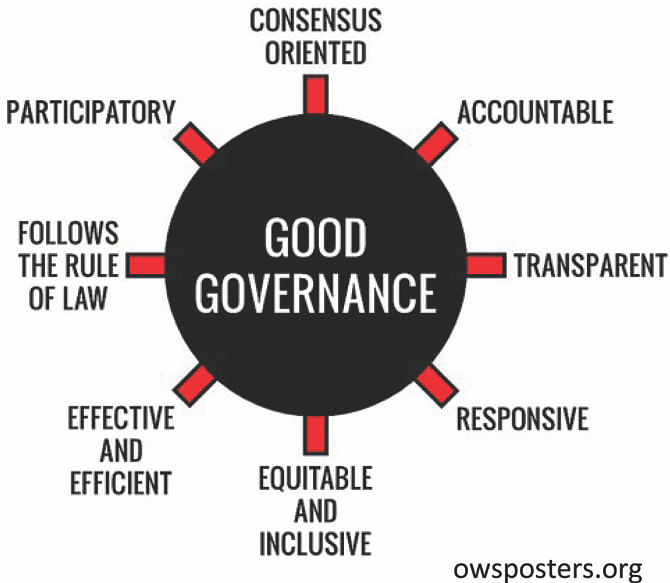Obstacles to Good Governance

Good governance is one of the desired aftermaths of the ruling principles in all forms of governing systems. Particularly in democracy there is no sweeter phrase than good governance coupled with accountability and no bitter ones than lack of tolerance and constructive criticism amid non-participation of opposition party or parties. In absence of strong opposition and pressure group, this form of government is considered to be worse than any other form of government resulting tyranny and elected dictatorship in the guise of embedded democracy.
Democracy is comparatively more tested governing system than other ones and as a result out of 206 sovereign states there are 137 democratic countries in the world. Like other forms of governments such as socialist, communist, monarchical or even in military dictatorship, democracy has its own discrepancy. The distinction of democracy from other forms of governing system is that in democracy the process is more valued than its outcome. But in other forms of governments outcome is measured in line with the adage end justifies the means. In a modern welfare state the role of a government is lot more than a laissez fair one which only aimed at protection of state and people from external force along with keeping domestic law and order.
The nature of obstacles in every form of government has its own distinctiveness and diversity. However, the hindrances of democracy in developed, developing and least developed countries cannot be measured in a same scale. Simultaneously the process to overcome the hurdles designing a healing parametre concerning the wounds of bad governance may not be same. Science and technology have reached the zenith of success but yet there is no invented panacea to cure and prevent all wounds as to any bad governance. Even, “one-size-fits-all” approach is not well-suited to diversified problems of states.
Even Americans are tired with their gun violence but they are yet to repeal the second amendment of the constitution protecting the right to keep and bear arms. Even there are pro-guns and anti-guns advocates with arguments and counter arguments as to gun rights, despite the horrible statistics that three people are killed in gun violence in every hour while seven people are shot. The federal Supreme Court in District of Columbia v Heller, 554 U.S. 570 (2008) held that Americans have an individual right to possess firearms for traditional lawful purposes such as self-defense at home. In McDonald v Chicago, 561 U.S. 742 (2010) the same court extended the scope of gun rights from home to individual state level. The United Kingdom despite being the hub of Westminster model of democracy still criticised by a group of its own nationals that their Prime Minister is an elected dictator. Suicidal rate is a serious concern here because three young males take their own lives each day across the country. More than one million people aged 16 to 24 are unemployed. Frustration is widespread, and localised reports of competition for jobs being as high as 50 applications per position are common. But the UK Supreme Court on January 6, 2014 as per its decision on December 16, 2013 changed its own webpage as www.supremecourt.uk from the previous domain of supremecourt.gov.uk sensing that the omission of “.gov” would step up its sanctity and independence.
Bangladesh as a darling child of nature is facing scores of impediments as to good governance. In its 43 years of journey the malnourished child of democracy has stumbled by military rulers for many times while the land of the country is 8-9 times more fertile than Japan.
World Bank Country Director, Johannes Zutt recently opined the country's politics as the main obstacle in establishing good governance. Apart from confrontational politics, partisan appointments of retired civil and military bureaucrats in autonomous state institutions as heads and affiliated members obliterate the potentials of good governance. Also, their alleged corruption to a massive scale in the name of law enforcement and providing of service is tarnishing the opportunity of good governance.
The United Nations Economic and Social Commission for Asia and the Pacific in a report in July, 2009 describes the term governance as the process of decision making and the way of implementing or not implementing of such decisions. The report also depicted eight major characteristics that contribute to good governance. These are accountability, adherence to the rule of law, effectiveness and efficiency, equity and inclusiveness, orientation towards consensus, participation, responsiveness, and transparency.
In democracy, the elected government is a pole of facilitators of the governance and trustee of people's power. When politics is devoid of principle it stands like a building without foundation. We are neither cynical nor pessimistic rather optimists believing that even after couple of decades or centuries the positive transformation will emerge as an evolution with sustainability in the democratic landscape of countries where most people are hungry for change but unmoved.
But expecting a revolutionary change in the presence of a branch of politicians' who may be the galaxy talents but behaving like a bag of weeds with corrupt mindset is too early! Being a part of “now generation” with the philosophy “Do It Yourself” will it be wiser to leave things for change to tomorrow's generation as it is said that tomorrow is a loser's excuse.
The writers are Assistant Professors of Law, Southeast University.

 For all latest news, follow The Daily Star's Google News channel.
For all latest news, follow The Daily Star's Google News channel. 



Comments